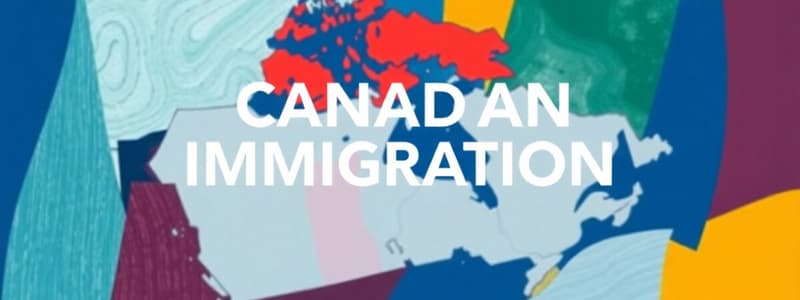Podcast
Questions and Answers
What is a primary requirement for obtaining a work permit in Canada?
What is a primary requirement for obtaining a work permit in Canada?
- Demonstrated proficiency in French or English
- An invitation from a Canadian resident
- Proof of citizenship from another country
- Evidence of temporary employment plans in Canada (correct)
Which of the following is NOT a factor that can influence Canadian immigration law?
Which of the following is NOT a factor that can influence Canadian immigration law?
- Social factors
- Political factors
- Religious beliefs (correct)
- Global communication advancements
Why is protection for asylum seekers and refugees important in immigration law?
Why is protection for asylum seekers and refugees important in immigration law?
- It simplifies the immigration process for all applicants
- It provides a safety net for vulnerable populations (correct)
- It reduces the number of applicants from certain countries
- It allows for quicker visa processing times
Which statement regarding penalties for immigration violations is accurate?
Which statement regarding penalties for immigration violations is accurate?
How do international agreements influence Canadian immigration laws?
How do international agreements influence Canadian immigration laws?
What is a key requirement for applicants seeking permanent residency in Canada?
What is a key requirement for applicants seeking permanent residency in Canada?
Which program allows Canadian citizens to bring family members into the country?
Which program allows Canadian citizens to bring family members into the country?
What does the points-based system for permanent residency assess?
What does the points-based system for permanent residency assess?
Which language proficiency tests are commonly required for Canadian immigration?
Which language proficiency tests are commonly required for Canadian immigration?
What is the purpose of a medical examination in the Canadian immigration process?
What is the purpose of a medical examination in the Canadian immigration process?
Which of the following is NOT a component of the points-based system for assessing permanent residency?
Which of the following is NOT a component of the points-based system for assessing permanent residency?
What is the main function of Temporary Resident Visas in the Canadian immigration system?
What is the main function of Temporary Resident Visas in the Canadian immigration system?
What can an individual achieve after obtaining permanent residency in Canada?
What can an individual achieve after obtaining permanent residency in Canada?
Flashcards
What are work permits for?
What are work permits for?
Work permits are required for individuals who want to work in Canada temporarily. They allow foreign workers to legally hold a job in the country for a specific period.
What are study permits for?
What are study permits for?
Study permits are essential for international students who wish to pursue education at Canadian educational institutions. They allow foreign students to legally study in Canada for a specific duration.
How do changes in Canadian immigration law happen?
How do changes in Canadian immigration law happen?
Canadian immigration law is dynamic and adapts to social, political, and economic factors. This means that requirements, procedures, and policies for visa applications are regularly reviewed and updated.
What are the consequences of breaking Canadian immigration law?
What are the consequences of breaking Canadian immigration law?
Immigration authorities enforce the regulations, and penalties can range from administrative fines to detention or deportation, depending on the severity of the violation.
Signup and view all the flashcards
How does the global context affect Canadian immigration?
How does the global context affect Canadian immigration?
Canadian immigration law is shaped by international agreements, treaties, and global trends. Canada collaborates with other countries to establish common standards, which can lead to changes and reviews in its immigration policies.
Signup and view all the flashcards
Canadian Immigration Law
Canadian Immigration Law
The set of rules and regulations governing who can enter Canada and for what purpose.
Signup and view all the flashcards
Points-based System
Points-based System
A way to evaluate immigration applications based on factors like education, work experience, and language skills.
Signup and view all the flashcards
Express Entry
Express Entry
A program for skilled workers and professionals to apply for permanent residency in Canada.
Signup and view all the flashcards
Family Sponsorship
Family Sponsorship
A way for Canadians to bring their family members to live in Canada permanently.
Signup and view all the flashcards
Provincial Nominee Programs (PNPs)
Provincial Nominee Programs (PNPs)
Programs that allow Canadian provinces and territories to nominate skilled immigrants for permanent residence.
Signup and view all the flashcards
Temporary Resident Visas
Temporary Resident Visas
Visas that allow individuals to stay in Canada for a limited period for reasons like tourism, study, or work.
Signup and view all the flashcards
Proof of Identity and Admissibility
Proof of Identity and Admissibility
Applicants must provide documentation to verify their identity and ensure they meet the requirements for entry to Canada.
Signup and view all the flashcards
Language Proficiency Tests
Language Proficiency Tests
Applicants must demonstrate fluency in English or French, often through exams like IELTS or CELPIP.
Signup and view all the flashcardsStudy Notes
Overview of Canadian Immigration Law
- Canadian immigration law governs the process of admitting individuals to Canada for various purposes, including permanent residence, temporary work, study, and family reunification.
- The law is complex and multifaceted, encompassing regulations, policies, and procedures.
- The Canadian government uses a points-based system for assessing applications for permanent residence.
- This system evaluates factors like education, work experience, language proficiency, and adaptability.
Key Immigration Programs
- Express Entry: A popular pathway for skilled workers and professionals to obtain permanent residency.
- Family Sponsorship: Allows Canadian citizens or permanent residents to sponsor family members for immigration.
- Provincial Nominee Programs (PNPs): Enable provinces to nominate individuals for permanent residence, often focusing on specific labor market needs.
- Temporary residence programs: These programs allow people to come to Canada for a set period for tourism, study, work, or other purposes.
Permanent Residency Requirements
- Points-based system: Applicants receive points for factors like education, language proficiency, work experience, and adaptability. Specific points are assigned to each criteria.
- Proof of identity and admissibility: Applicants must provide documentation to verify their identity, absence of a criminal record, and freedom from health concerns.
- Medical examination: Applicants must undergo a medical examination to ensure they do not pose a risk to the Canadian public health system.
- Language proficiency tests (e.g., IELTS or CELPIP): Applicants must demonstrate proficiency in at least one official language of Canada (English or French). Language tests are often required.
- Financial capacity: Applicants must demonstrate that they have sufficient funds to support themselves and their dependants for a designated period.
- Character verification: Background checks are conducted to ensure applicants have no criminal background incompatible with Canadian laws. This is a crucial factor in security and safety assessments.
- Citizenship: Applicants who obtain permanent residency can progress to Canadian citizenship, fulfilling specific conditions over a designated period.
Temporary Resident Visas
- Purpose: These visas permit individuals to visit Canada for tourism, study, or work for a set period.
- Requirements: Vary depending on the visa type, requiring details about length of stay, plans in Canada, and intended purpose.
- Work permits: Required for individuals seeking temporary employment in Canada.
- Study permits: Necessary for international students to study at Canadian educational institutions.
Ethical Considerations and Vulnerable Groups
- The effects of immigration and the legislation surrounding this area directly impact individuals.
- Immigration policies are subject to ongoing scrutiny regarding fairness, inclusion, and impact on vulnerable populations.
- Protection for asylum seekers and refugees is a vital part of immigration law, with specific procedures and guidelines.
Changes in the Law
- Canadian immigration law frequently changes based on social, political, and economic factors.
- Updates in requirements and procedures regarding visa applications are common.
- Updates are consistently reviewed, studied, and adapted at regular intervals.
Key Enforcement and Penalties
- Immigration authorities enforce regulations and ensure compliance.
- Penalties vary based on the severity of the violation, ranging from administrative penalties to detention or deportation.
- Robust investigative procedures are employed by immigration authorities to ensure adherence to the law.
Canadian Immigration and the Global Context
- Immigration laws are influenced by international agreements, treaties, and global trends.
- Canada interacts globally with other countries to create common standards, leading to adjustments and reviews based on these international relationships.
- Globalization and advancements in communication affect how Canadian immigration law evolves.
Studying That Suits You
Use AI to generate personalized quizzes and flashcards to suit your learning preferences.




